How Workers Want Employers To Address Social Justice Issues
Abortion access. LGBTQ rights. Voting laws. Black Lives Matter.
As divisive social issues in the United States continue to dominate headlines and employee headspace, companies are presented with a dilemma: “Should I take a stance, or should I stay silent?”
If you’re an HR manager or another company leader tasked with figuring out the answer, it’s a true double-edged sword. On the one hand, if your company takes action on the right causes in the right ways, it can improve employee engagement, strengthen the employer brand in the eyes of talented job seekers, and even attract increasingly socially-conscious customers.
On the other hand, taking an unpopular stance—or even a popular stance in the wrong way—can cause distraction, stir up conflict, or be tone-deaf enough to convince employees to go work elsewhere. Doing nothing, which can be misunderstood as an implied acceptance of injustice, can be damaging too (just ask Coca-Cola).
For insights on what companies should do in this tricky situation, Software Advice’s Social Justice Response Survey* asked close to 500 U.S. employees for their thoughts on how their employer has responded to social justice issues so far, and what they wish their employer would do in the future.
What we learned is that employees can be equally divided on what companies should do, but there are indicators that can push companies in the right direction on when and how to act.
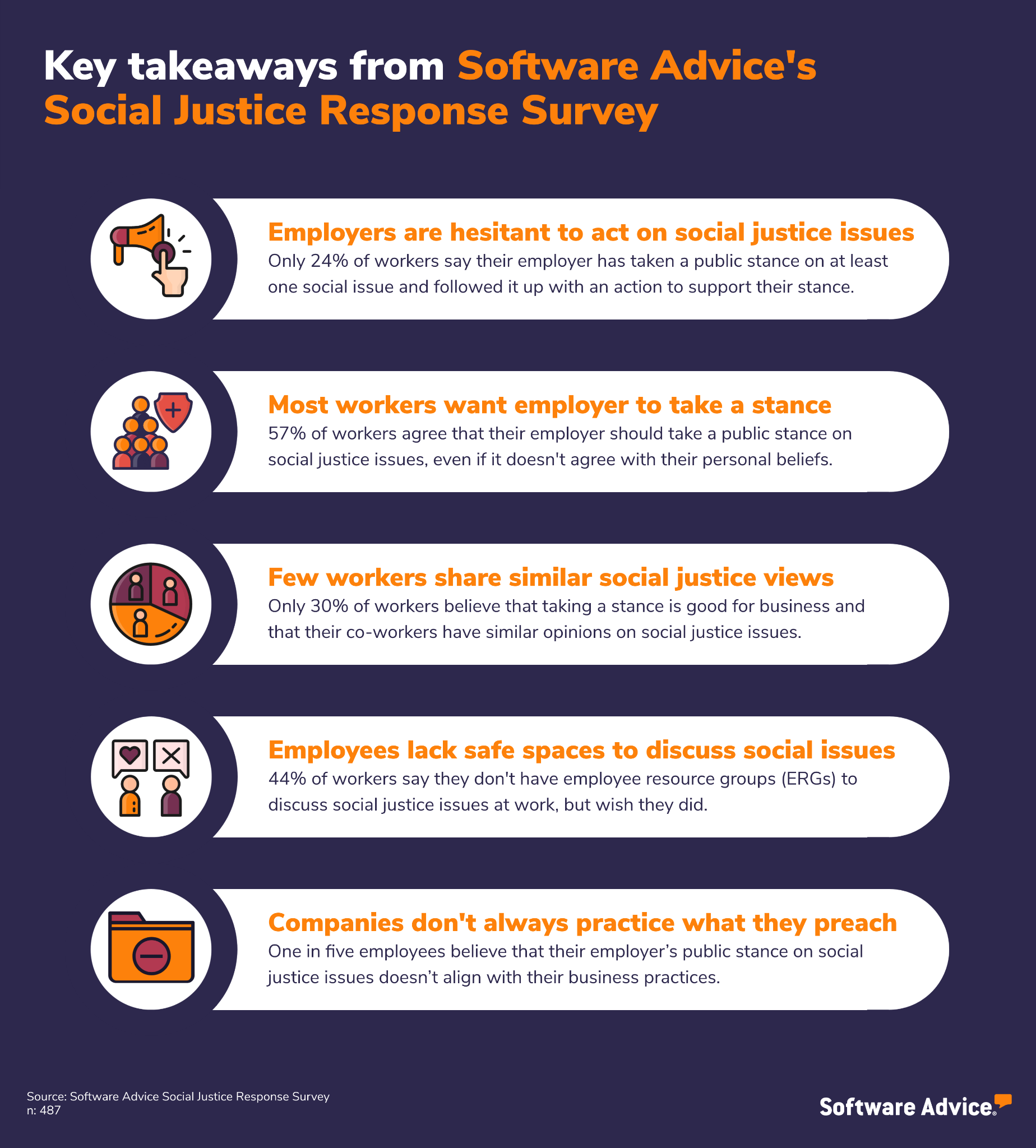
Employers are split on how to address social justice issues
When we asked employees in our survey how their employer has responded to social justice issues so far, a clear divide in tactics emerged. 38% of employees say their employer has been totally silent on social justice issues, 39% say their employer has taken a public stance on at least one issue without follow-up action, and 24% say their employer has taken a public stance on at least one issue and followed it up with an action to support their stance (e.g., donating money).
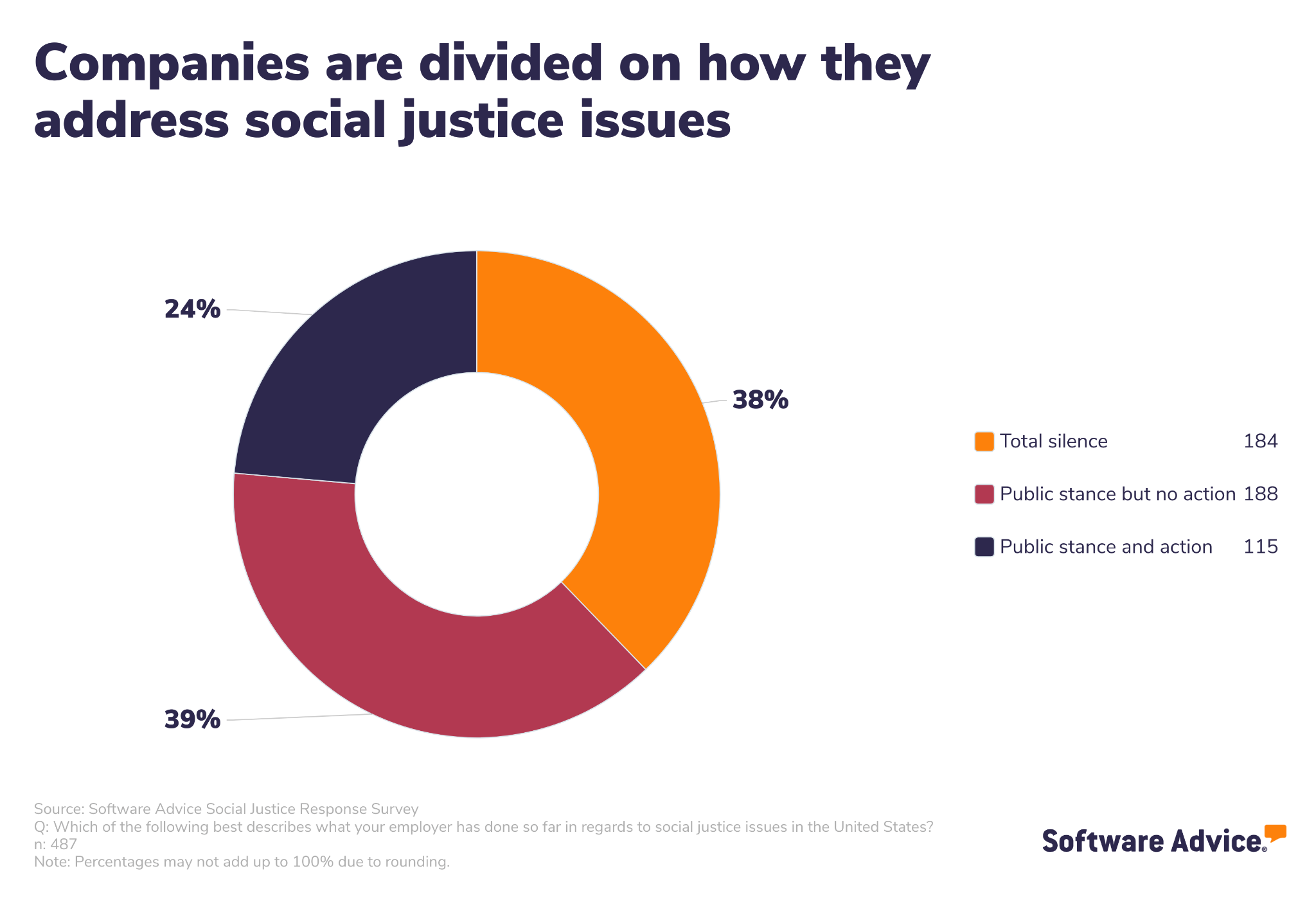
Digging deeper, we notice a few trends. Likely because they face less scrutiny (internally and externally), we find that smaller companies tend to remain silent on social justice issues more often than larger companies: 43% of workers from businesses with five to 100 employees said their employer has been totally silent versus 27% of workers from businesses with more than 1,000 employees.
We also find that out of all the industries represented by at least 30 responses in our survey, construction firms take the silent approach most often (47%), while retailers and restaurants are most likely to take a stance and perform follow-up action (28%). Restaurants in particular have been eager to tap into social justice issues, which has produced both newsworthy success stories and notorious misfires.
Aside from a few tendencies though, our data highlights the divergent paths that companies have taken on addressing social justice issues up to this point, adding to the confusion on what the best strategy is. A Gartner survey exemplifies this conflict perfectly: 51% of CEOs from North American companies believe that taking a public stance on social justice issues is good for business, while 49% believe it’s potentially damaging, or have no opinion (full research available to Gartner clients).
Next steps
Social justice issues are nuanced and complex, and your company’s role within them can be influential or inconsequential. As such, there is no one-size-fits-all strategy that every business should take when addressing these types of issues. HR leaders should work together with executive leadership and PR on each issue separately as situations develop internally or in the community to come up with an appropriate response.
Many workers want their employer to take a stance (even if it’s one they don’t agree with)
When deciding on how to tackle social justice issues, your employees may be able to provide clarity. If an overwhelming number of workers are passionate that your company should take a certain stance or perform a certain action, the potential backlash from not doing so could be substantial.
But our data indicates that your workforce likely isn’t of one mind on social justice issues. We asked the employees in our survey if they agreed or disagreed with the following statement: “I want my employer to take a public stance on social justice issues, even if it doesn’t agree with my personal beliefs.”
57% agreed with the statement—a majority, but not an overwhelming one.
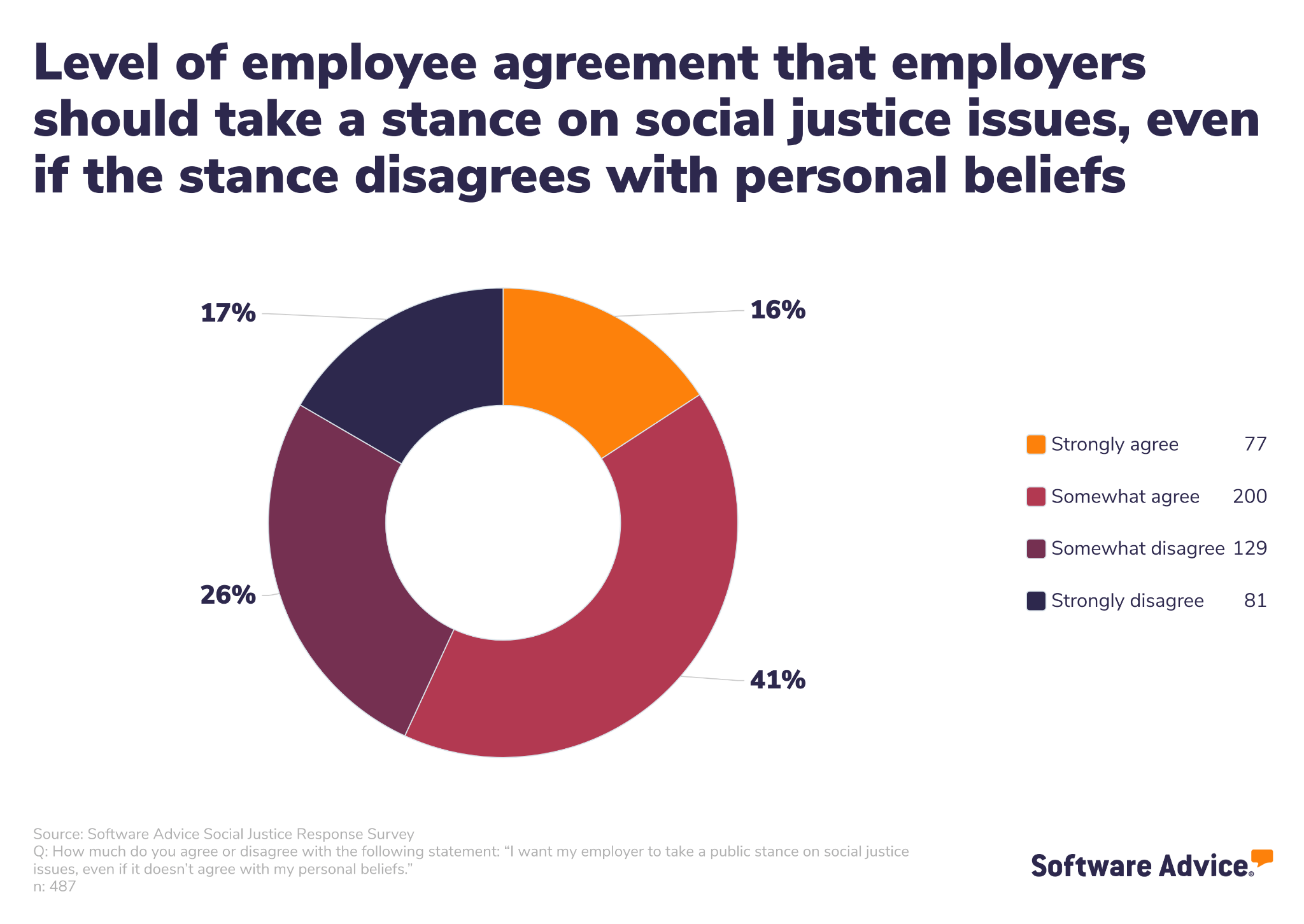
Here again, a few trends emerge when we look at different demographics:
Black employees are particularly keen on their employer taking a public stance, as 74% agreed with the statement above.
Workers with college degrees are more likely to want their employer to take a public stance on social justice issues than those without one (59% versus 48%).
There’s an inverse correlation with age: 63% of workers aged 18 to 25 agreed that employers should take a public stance on social justice issues, compared to only 45% of those aged 46 to 55.
Women are slightly more likely to say that their employer should take a stance on social justice issues than men (60% versus 56%).
However, there is no situation where we end up with more than three-quarters of employees agreeing or disagreeing that their employer should take a public stance on social justice issues.
To further highlight this lack of consensus, we asked the employees in our survey two questions: 1) Is taking a public stance on social justice issues good or bad for business?, and 2) Do you believe your co-workers have similar or differing opinions on social justice issues and the actions their employer should take?
Less than a third of respondents (30%) fell into the sweet spot for employers eager to act—believing both that taking a stance is good for business, and that their co-workers have similar opinions on social justice issues and the actions their employer should take.
Employee views on social justice issues
Co-workers have similar opinions on social justice issues | Co-workers have differing opinions on social justice issues | Not sure or have no opinion | |
|---|---|---|---|
Taking a stance on social justice issues is good for business | 30% | 12% | 2% |
Taking a stance on social justice issues risks hurting the business | 15% | 17% | 5% |
Not sure or have no opinion | 6% | 7% | 6% |
Source: Software Advice Social Justice Response Survey
Q1: Overall, do you think your employer taking a public stance on social justice issues helps or hurts the business?
Q2: Which of the following best describes you and your co-workers’ current opinions on social justice issues in the United States?
n: 487
If it wasn’t obvious before, these results highlight that any social justice response strategy you go with is unlikely to make every employee in your organization happy. Company leaders should work together to gauge the employee response to any given strategy, and go with the one that will produce the most benefits or the least amount of backlash.
Next steps
Though our results indicate worker opinions on social justice issues often differ greatly at a macro level, that doesn’t mean your business can’t be uniquely unified. Where you’re located, what industry you’re in, and who’s compelled to apply for a job at your organization can all influence workforce opinions on social justice issues.
This is where something such as an employee pulse survey tool can be invaluable. Using these tools, you can poll your workers and get a “pulse” on how they feel about divisive issues. You may learn that a lot of workers are eager for you to take action, or that they don’t care one way or the other. You can also learn how much damage a certain response has the potential to cause.
The opinions of other stakeholders, such as customers, should be taken into consideration too. But with pulse survey tools, there’s no excuse for not knowing where your workforce stands.
3 tips for addressing social justice issues
It is impossible and impractical for your company to speak up on every social issue. At the same time, the days of companies completely staying out of divisive societal issues are over. Saying nothing at the wrong time can do lasting damage to your employer brand.
So when should you take a stance? And how should you go about it? Here are our three tips for how to address social justice issues and do right by your employees.
1. Give up on being an apolitical workplace
The stance you take on social justice issues as a company will depend on a variety of factors, but how you respond to discussions about social justice issues in the workplace should be unilateral: Let them be.
As seemingly stress-free as it would be to have an “apolitical” workplace, putting a clamp down on what employees can talk about at work will only lead to distrust and backlash. Just ask Basecamp, who saw a full one-third of their workforce leave earlier this year after the CEO banned employees from openly sharing societal and political opinions at work. A similar situation unfolded at Coinbase in 2020.
Instead of working against political and social discussions at work, our advice is to lean into them. One in four workers in our survey disagree that their employer has created a safe space where they feel comfortable voicing their opinions on social justice issues in the United States. Furthermore, only 27% say that their job has employee resource groups (ERGs) for workers to be able to discuss social justice issues. 44% don’t have ERGs at work, but wish they did.
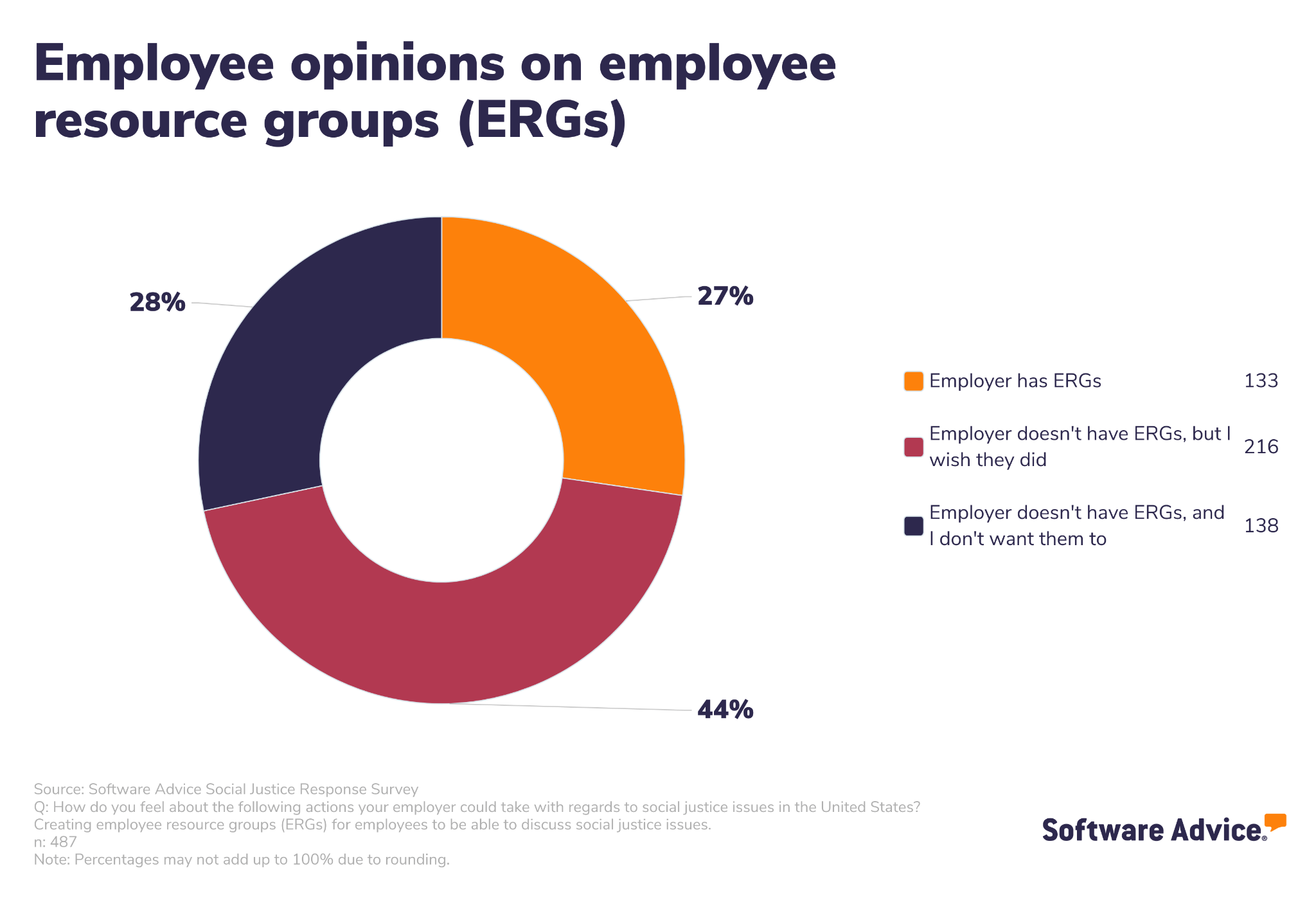
ERGs are voluntary, employee-led groups where employees can discuss and debate social issues amongst themselves. As long as rules are put in place for employees to be respectful of one another’s opinions and not escalate conflict, ERGs can be a great way for your company to facilitate difficult discussions at work without taking an official stance.
2. Take meaningful action when a cause aligns with your brand identity
Knowing when to take a public stance on social justice issues can be tricky, but a good rule of thumb is the closer the issue is to your company’s brand and identity, the more likely it is that you should say something and take meaningful action.
This tip is best illustrated with two examples. In 2015, after widespread protests over police brutality and racial injustice in Ferguson, Missouri, Starbucks launched its “Race Together” campaign. Employees were encouraged to write the campaign name on Starbucks orders and engage in conversations with customers about racial injustice.
The campaign was a massive failure among the press and Starbucks’ own employees. Why? For one thing, the campaign was seen as performative—nothing that Starbucks did had the ability to meaningfully affect racial injustice. It also didn’t make sense for the brand. Customers wanted coffee on the way to work; they didn’t want to talk about systemic issues with baristas.

Starbucks’ “Race Together” campaign was a notorious flop. (Source)
Contrast this with AirBnB. The property rental company, whose entire identity revolves around travel and lodging, has launched numerous campaigns in recent years to address societal issues in these areas.
When President Trump banned travel and immigration between the United States and several predominantly Muslim countries in 2017, AirBnB offered free housing to refugees and blocked travelers. They further cemented their stance with a Super Bowl ad targeted at Trump’s policies. The company would go on to address California’s housing inequality in 2019, pledging $25 million to affordable housing construction. Both moves were big wins for the company.
It’s not very likely that you have millions of dollars laying around that you can donate, and that’s OK. Whether it’s partnering with non-profit organizations, setting up fundraising events, or flagging volunteer opportunities for employees, there are more affordable ways to get meaningfully involved. The point is, the more a cause is tied to your brand, the more urgent it is for you to act.
3. Make sure you practice what you preach
If there’s one thing people hate more than a performative social justice stance, it’s a hypocritical one. Adidas found this out the hard way when, after speaking out against racism on social media in the wake of the murder of George Floyd, employees were quick to point out the shoemaker hadn’t done enough to address long-standing discrimination and racism issues in their own workplace. Workers complained, then protested. Eventually, the head of HR was fired.
But Adidas is far from the only company in danger of appearing two-faced: Of the employees at companies that have taken a public stance on a social justice issue in our survey, one in five believe that their employer’s public stance doesn’t align with their business practices.
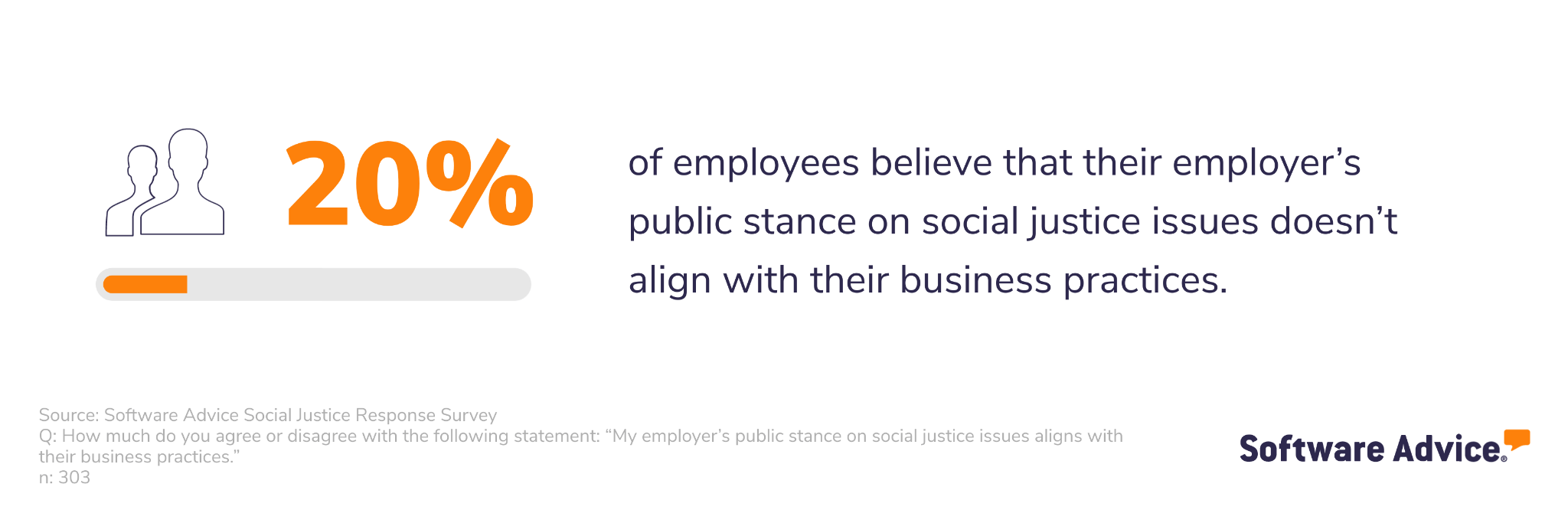
The lesson is clear: If you’re taking a stance on racism, LGBTQ rights, or any other issues regarding equality, ensure your diversity, equity, and inclusion (DEI) efforts are up to snuff. If you’re addressing climate change, evaluate how sustainable your production processes really are. And if you’re speaking up about healthcare access, you should be certain you offer good health insurance.
Business goals, brand reputation, societal context, and stakeholder demands all play an important role in how your company should respond to hot-button societal issues in the United States. Your employees may not be able to illuminate the best strategy every time, but if you foster safe spaces for discussion, take formidable action on causes close to your brand identity, and practice what you preach internally, good results will happen more often than not.
For more help on how to create a fair and equitable workplace, check out these additional resources:
Survey methodology
*The Software Advice Social Justice Response Survey was conducted in July 2021. We collected 487 responses from full- or part-time workers at U.S. businesses with at least five employees. The goal of this survey was to learn employee sentiment about how their employer should respond to social justice issues in the United States.